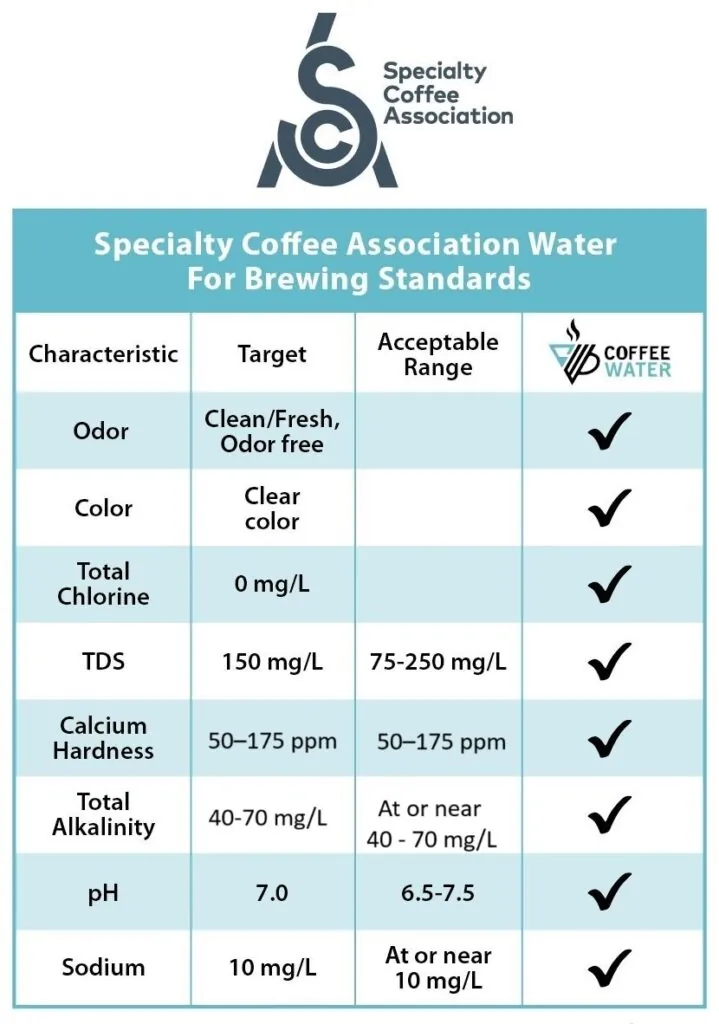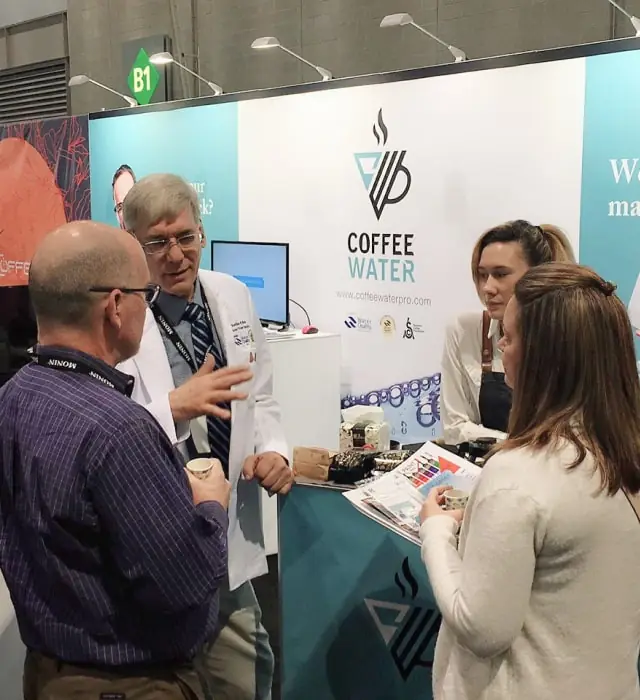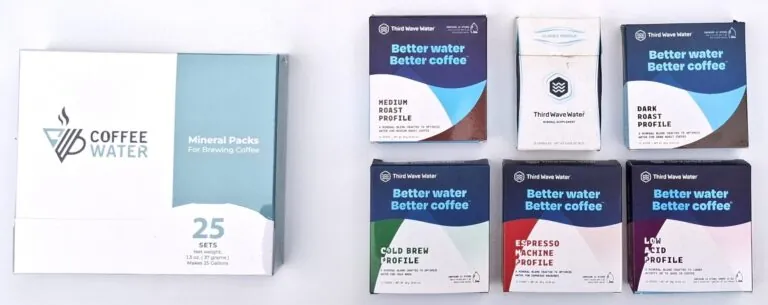Numerous excellent resources have been published on the subject of water for coffee. Authoritative sources, such as the Specialty Coffee Association (SCA) and the University of California, Davis Coffee Research Center, along with private sources, have provided comprehensive insights into how water minerals influence coffee brewing.
Instead of delving into exhaustive details about various aspects of water’s impact on coffee brewing, we will provide an overview of key concepts and offer links to websites where you can explore these valuable sources for more in-depth information if you wish to understand the science behind what makes great coffee.


How Do Water Minerals Affect Coffee Taste?
The SCA and many coffee research centers have studied how minerals in water affect the extraction of flavor from coffee beans. They generally agree on four basic profiles that influence coffee flavor, depending on the mineral and alkalinity (carbonate) content of the water (refer to the chart below.)
The positive ions of calcium and magnesium attract the flavor molecules of coffee and extract the flavor from the bean. Since these flavor molecules are acidic, they can make the coffee taste sour unless there is sufficient alkalinity (in the form of bicarbonate) to buffer them. Bicarbonate reacts with the flavor molecules to release CO2 and provide the coffee with a smooth, rich taste. This combination of acidity and alkalinity is what gives espresso coffee its “crema,” the smooth texture that enhances its taste. However, the bicarbonate cannot be too high, so it does not mask the acidic flavor molecules. Therefore, the balance of minerals and alkalinity is crucial for achieving the proper taste balance.

No One-Size-Fits-All Flavor Formula

The mineral content required for making water suitable for making third wave quality coffee is not some industry-patented secret. It is in the public domain, and various websites offer formulas for creating your own coffee water. However, the chosen mineral content varies according to personal preference, so even experts have slightly different preferences for the mineral content of their water when brewing coffee.
This chart shows a range of mineral and bicarbonate concentrations commonly accepted for brewing good coffee. Using water outside of this zone will result in coffee with an off taste.
Too high mineral content and too low alkalinity produce a heavy, dull, sour taste.
Too high mineral content and too high alkalinity yield a heavy, flat, chalky taste.
Low mineral content and low alkalinity result in an empty, sharp, sour taste.
Low mineral content and high alkalinity create an empty, flat, chalky taste.
COFFEE WATER falls approximately in the middle of the spectrum, assuring you that coffee minerals are suitable for any brewing method. You can experiment with this chart by trying slightly more concentrated or diluted solutions to determine which mineral content best aligns with your taste preferences. There’s no need to purchase multiple solutions for different brewing methods.
SCA Standard Recipe
The Specialty Coffee Association (SCA) is an exceptional group of dedicated individuals committed to delivering the best coffee experience for everyone. Arguably, it stands as one of the most reliable sources for comprehensive information on coffee preparation. This nonprofit, membership-based organization represents thousands of coffee professionals, ranging from producers to baristas worldwide. It builds on the principles of openness, inclusivity, and the sharing of knowledge, all aimed at nurturing a global coffee community and supporting initiatives to ensure specialty coffee thrives as an equitable and sustainable industry throughout the entire value chain.
The official SCA specifications, as outlined in the SCA Coffee Value Assessment Standards, recommends a preferred water for coffee with a total hardness ranging from as low as 50 ppm up to 175 ppm, and an alkalinity level at or near 40 ppm. https://sca.coffee/research/coffee-standards (Coffee Value Assessment: Sample Preparation and Tasting Mechanics. p. 11)
Barista Hustle Formula
In 2019, I had the pleasure of meeting Matt Perger, the founder of Barista Hustle, at the Boston Coffee Expo, where we discussed various minerals for coffee water. Barista Hustle stands out as one of the most straightforward websites that provide education on coffee brewing. They offer instructions on how to prepare concentrated solutions of baking soda and magnesium sulfate, which can later be measured and mixed with the desired amount of deionized or pure water when you’re ready to brew your coffee. https://baristahustle.com/blog/diy-water-recipes-the-world-in-two-bottles/
What About Chloride? Why Add Chloride?
Chloride enhances the perception of sweetness in foods. However, too much chloride can give food a salty flavor. This is why a dash of salt (sodium chloride) enhances the flavor of food, but too much can give an off taste.
Sulfate
Sulfate also enhances the perception of sweetness; however, excessive levels of sulfate may result in a bitter taste.
The levels of chloride and sulfate in COFFEE WATER are healthy and play an important role in enhancing and bringing out flavors in coffee.

Is Reverse Osmosis Water Good for Making Coffee?
Great drinking water can be used to make great water for brewing coffee.

If you have a reverse osmosis (RO) water filter system, you are already enjoying great-tasting and healthy drinking water. Unfortunately, due to its low mineral content, RO water is not efficient at extracting the full flavor from coffee beans. However, RO water is the perfect starting point for adding the proper balance of minerals for making coffee.
By adding COFFEE WATER mineral packs to RO purified water or distilled water, you will obtain water that precisely meets the standards set by the Specialty Coffee Association for brewing coffee.
- Perfect for use with reverse osmosis (RO) filtered water or distilled water.
- Takes the guesswork out of making the best water for coffee.
- Safe for coffee makers
- Balanced for the best flavor across all pour-over, coffee maker, and espresso profiles.
COFFEE WATER meets every standard perfectly.
Why Does Coffee Water Come in Two Packets?

Packet A contains minerals that extract the flavor from the coffee beans.
Packet B balances the pH and buffers the acidity from the beans, resulting in a smoother taste.
Both packets are necessary, but if they were combined into a single packet, they would react and solidify, forming a rock that takes a very long time to dissolve. To prevent this, we package them separately, ensuring that each one dissolves instantly.
KofeSolutions In-House R&D

KofeSolutions brings water filtration professionals and manufacturers together with coffee roasters and baristas to develop the best water solutions for achieving exceptionally great tasting coffee.
We sincerely hope that the dedication and effort we invested in developing COFFEE WATER will eliminate the guesswork for you and help you achieve consistently outstanding coffee results.





